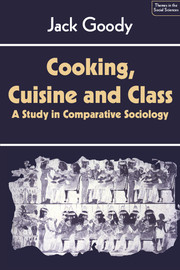Book contents
- Frontmatter
- Contents
- List of illustrations
- Preface
- Dedication
- 1 Intentions and remarks
- 2 State of play
- 3 Production and consumption among the LoDagaa and Gonja of northern Ghana
- 4 The high and the low: culinary culture in Asia and Europe
- 5 Industrial food: towards the development of a world cuisine
- 6 The impact of the world system
- 7 Cooking and the domestic economy
- Appendix: Terms, operations and cognition
- Notes to the text
- Bibliography
- Index
- BY THE SAME AUTHOR
7 - Cooking and the domestic economy
Published online by Cambridge University Press: 05 June 2012
- Frontmatter
- Contents
- List of illustrations
- Preface
- Dedication
- 1 Intentions and remarks
- 2 State of play
- 3 Production and consumption among the LoDagaa and Gonja of northern Ghana
- 4 The high and the low: culinary culture in Asia and Europe
- 5 Industrial food: towards the development of a world cuisine
- 6 The impact of the world system
- 7 Cooking and the domestic economy
- Appendix: Terms, operations and cognition
- Notes to the text
- Bibliography
- Index
- BY THE SAME AUTHOR
Summary
In looking at the nature of cooking, and more generally at the mode of consumption and the way it is related to production, we have drawn a broad contrast, often implicitly, between the practices found even in the states and empires of Africa on the one hand, and those of the major societies of Europe and Asia on the other. This comparison was not undertaken as an exercise in taxonomy, let alone geography, but in order to throw some light on the social processes at work.
In looking at the cuisines of the Eurasian societies, we noted a set of specific characteristics:
1. The link between cuisine and ‘class’, with social groups being characterised by different styles of life.
2. The contradictions, tensions and conflicts connected with this differentiation. The various forms include the contradiction between ideologies of equality (which for St Francis were religious, for Djilas revolutionary and for Mencius philosophical) and ideologies of hierarchy (both in church and state), as well as the conflict, at the individual as well as the group level, between fasting acknowledged as ‘good’ and feasting as ‘pleasurable’. In the case of the Yugoslav Djilas, the contradiction was exacerbated by the external situation, by the identification of luxury with the foreigner, or with foreign influence.
3. The increased range of ingredients and menus resulting from exchange, tribute and commerce, based on the continuing interplay between the haute cuisine and ‘peasant’ cooking, if only because the latter were the source of the basic foodstuffs.
- Type
- Chapter
- Information
- Cooking, Cuisine and ClassA Study in Comparative Sociology, pp. 191 - 215Publisher: Cambridge University PressPrint publication year: 1982

